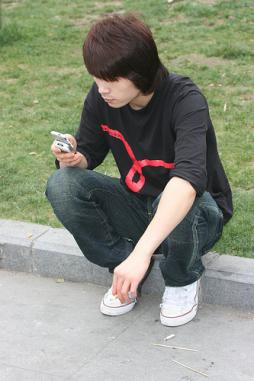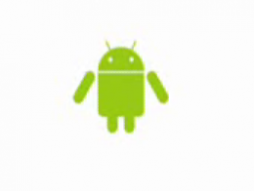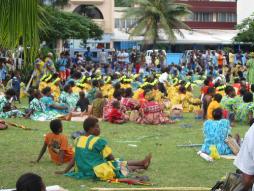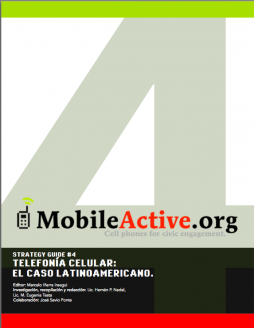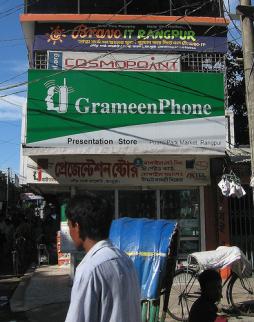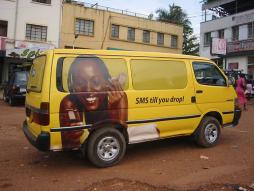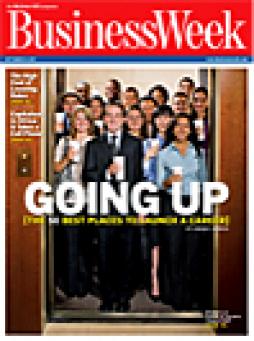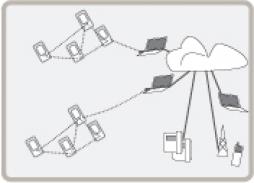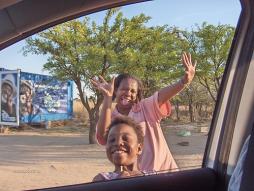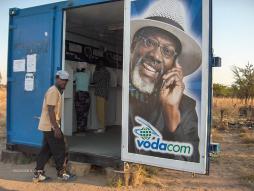Livelihood & Economic Development
Posted by CorinneRamey on Nov 09, 2007
Understanding a housing mortgage isn't easy, especially within today's so-called subprime mortgages filled with legalese, deceptive interest rates and dishonest brokers. Having English as a second language doesn't make it any easier. Jeremy Liu and Tad Hirsch, the developers of Speakeasy, are using mobile phones to help non-English speakers fight the subprime mortgage crisis in the United States with an Asian-language specific foreclosure prevention hotline. MobileActive interviewed Liu for more information on this still-developing project.
Liu and Hirsch have developed a hotline that will connect Asian-language speakers faced with foreclosure or subprime mortgages with information in their native languages. Liu said that although similar hotlines exist in Spanish, there is no language-specific hotline for Asian languages. This leads to an information gap for Asian homeowners with subprime mortgages, many of whom don't know where to turn for foreclosure prevention assistance.
Posted by KatrinVerclas on Nov 05, 2007
Google announced today Android and of the Open Handset Alliance, throwing wide open the field of mobile applications for commercial and social and civic causes and potentially much cheaper handsets that are especially important in developing countries. We here at MobileActive.org think that this will spur developments for the social sector that are faster and cheaper -- an "Android for Good."
The Open Handset Alliance is a consortium of more than 30 tech and mobile companies and Android is its open platform. Google's support of the project and development of the new mobile app software stack that includes an operating system, moddleware and open applications development is significant and seen as a major competitor to other mobile platform providers such as Microsoft, RIM, and Symbian.
Posted by KatrinVerclas on Oct 30, 2007
Imagine an industry conference of IP communciations where coders are mashing up an SMS application for a small NGO researching best practices for poverty alleviation. We were curious about what that might look like, so MobileActive.org is at the annual VON conference, the industry gathering of IP communications firms. At its unconference-style Innovation Track, there will be gathering of coders producing an SMS platform for an NGO focused on evaluating poverty alleviation efforts in developing countries. The mashup sponsored by the Thomas Howe Company, a Voice over IP (VOIP) communications firm that focuses on mashups for the enterprise.
We published a recent call for submission of use cases when we first learned about this effort. While typically these kind of 'volunteer coding' projects lack in long-term sustainability and enterprise-level scaling, we are interested in seeing what will become of this mobile text-to-speech platform that will be used in evaluating microfinance loan offerings in the Phillippines and South Africa.
Posted by KatrinVerclas on Oct 11, 2007
Hoy introduce MobileActive un recurso nuevo para los activistas movilistas. Esta guía de estrategia en español tiene información detallada sobre el uso de los teléfonos celulares en América Latina y estudios sobre los celulares usados por el activismo social en varios países latinoamericanos.
Today MobileActive introduces a new resource for mobile activists. Our first Spanish-language Strategy Guide provides detailed information about the use of mobile phones in Latin America and case studies of mobiles used for social activism in different Latin American countries.
Posted by CorinneRamey on Oct 08, 2007
Abu Sufian's small room in Fultola, Bangladesh looks like a standard Internet cafe. There are four workstations -- each with a mouse, keyboard, and monitor -- where customers can check email or browse the Internet. But this isn't just any Internet cafe -- the center is all made possible by one mobile phone.
According to this article from Telecentre.org, this "Community Information Center" only has one computer, which acts as a server for the other workstations. Internet access is provided by the EDGE-enabled (Enhanced Data Rates for GSM Evolution) mobile phone. From the article:
Posted by KatrinVerclas on Oct 02, 2007
MobileActive.org series on mobiles in development continues. Here is guest writer Abi Jagun from the University of Manchster who deconstructs the hype on mobiles in civil society:
By the end of 2007 about half of the world’s population will be using mobile phones; and it is likely that this proportion will continue to increase as more people - predominantly in developing countries - get connected to mobile telecom networks.
The benefits of mobile phones continue to be widely publicised. In particular, they allow people to receive and communicate information interactively and/or simultaneously by voice and data -- beyond the physical limitations imposed by geography. But is the hype useful for a throughtful exploration of the potential of mobiles in development, or, in fact, a hindrance?
Posted by CorinneRamey on Sep 28, 2007
The rural mobile market is growing, and carriers are working to meet the unique demands and challenges of this sector of the population. Even in the poorest countries -- like Sierra Leone, which ranks 176 out of 177 countries on the UN's 2006 Human Development Index -- mobile phones have become a growing necessity, creating a unique set of cultural norms and practices. According to a recent article in Africa News, "It is no secret that Sierra Leone has one of the largest mobile network services although said to be the least developed country in the West African Sub-Region." Mobile service in Sierra Leone is covered by three carriers -- Mobitel, Celtel and Millicom. Although the network has increased dramatically since the civil war ended in 2000, there is still demand from rural customers for more comprehensive coverage in poor rural areas.
Posted by CorinneRamey on Sep 28, 2007
Mobile use and prevalence is exploding throughout the developing world. As Tim Kelly writes in id21 insights's September newsletter, in 1990 there were only 14,200 mobiles in Africa, which by, 2005, grew to a total of 137 million. Id21 predicts that the majority of the world's poor will have mobile access within the next generation. This number continues to increase, showing just how important mobile phones have become in development.
In our ongoing series on mobiles in development -- m4dev, as we are calling it, we are pleased to see that id21 focuses its current newsletter on mobiles used in development, with articles profiling mobiles used in countries including Nigeria, Bangladesh, Jamaica, and Zambia.
Posted by CorinneRamey on Sep 24, 2007
Programs all over the world have shown how mobiles can be an effective tool in providing services to homeless individuals, people with AIDS, and other marginalized populations. Here are a few of the most effective efforts to involve mobiles in innovative ways.
The stereotype is that homeless people don't need mobiles. Why bother with a phone when you can barely afford to put food on the table or don't even have a bed to sleep in? But several different projects have shown that mobile phones can be an important stepping stone in brealing a cycle of poverty. Most importantly, mobiles allow homeless people to get jobs. Employers aren't likely to respond to a resume that lists the phone number of the local homeless shelter, or worse, one without a phone number at all.
Posted by KatrinVerclas on Sep 19, 2007
Owning a mobile is becoming an indispensable element of young people's lives all around the world. This well-done 30-min video focuses on mobiles in education, explores whether mobiles are a force for good, or an example of technology gone awry; and offers a lot of cultural analysis of how young people use mobiles.
Produced by teachers.tv about young people's use of mobiles (albeit UK-focused), it is a good look at the world of young people with mobile phones, and the impact on schools and education. Young people are mobile natives and schools and NGOs better take heed.
Posted by KatrinVerclas on Sep 18, 2007
We are starting a series of articles on mobile phones in economic development this week and to kick it off, Business Week in its current issue published a few interesting summaries of the state of affairs in mobiles in economic development. This apparently just to make it easy for us to get MobileActives around the world up to speed!
Upwardly Mobile in Africa describes farmers in Kenya using mobiles to bring their products to market and mobile payments using the Keyan mobile payment system M-Pesa. The article describes Grameen Foundation's Village Phone Program that we will be featuring in our next article that is expanding into Uganda in collaboration with the local carrier MTN where there are now 13,000 Village Phone Operators renting out a mobile phone with the help of microcredit and discounted airtime.
Posted by KatrinVerclas on Sep 12, 2007
MobileActive friend and colleague Anders Carlius runs Terranet, an innovative company providing mobile peer-to-peer technology. Anders is a former businessman from Sweden who decided he wanted to do good in the world with a new venture after a career in telecommunications. His company is after an emerging market in developing countries with either a rural or densely populated market (such as a refugee camp, for exaple).
The technology is simple: Terranet outfits a special Erricson phone with peer-to-peer wireless networking ability. In its pure form, there is no need for base stations, antenna installations or infrastructure. With this phone, a user can call and text anyone at no cost within two kilometers, or up to 20 kilometres in a mesh network. Through TerraNet wireless Internet access point, the phone turns into a normal wireless communication device.
From Terranet's prospectus:
Posted by KatrinVerclas on Jul 23, 2007
Technology that has been taken for granted by people in wealthy countries is making life easier and safer for many poor in developing countries.
The rapid spread of cellular telephones in many African countries has been a remarkable and unexpected phenomenon particularly when one considers the high levels of poverty and social turmoil that occurs in many of these countries. Last year the Enterprise Africa! team visited Botswana in order to document the poverty alleviating aspects of the cellular telephone. Technology that has long been taken for granted by people in wealthy countries is making life easier, safer, and more prosperous for many, including the poor in developing countries. A result of the rapid diffusion of this technology is the creation of a vast number of jobs and enterprises, enabling many Africans to escape the poverty trap.
The most obvious benefit of cellular telephones is that they provide access to communication where none existed before. Families in remote areas, and farmers and businesses that could not afford or even obtain fixed lines, are now able to talk with loved ones, receive orders, schedule deliveries, and make appointments. Mobile phones were an immediate success, even in areas that already had access to landlines, because in addition to connectivity they offered services like itemised billing, prepaid or contract options, and other value-added services.
Posted by KatrinVerclas on Jun 11, 2007
Protest campaigns in recent weeks in China and Pakistan are pointing to a quickening pace of social activism primarily enabled by mobile phones.
On May 31, 2007, authorities in Xiamen halted construction of a large petro-chemical plant, following a furious Internet, street, and text campaign. The story began on a few local blogs, spread wide on the Internet with sites like antipx.com, and street graffiti.
On March 25, according to news reports in the Asia Sentinel, Sydney Morning Herald and others, a text message began circulating:
Posted by KatrinVerclas on May 09, 2007
Ethan Zuckerman has written a solid overview of mobile phones in international activism. It is re-posted here under its Creative Commons license. For additional resources, see also the mobileactive.org Strategy Guides on using mobile phones in elections, advoacy, and fundraising.
Posted by Bonnie Bogle on Oct 13, 2006
In very exciting news, microcredit pioneer Muhammad Yunas and the Grameen Bank he founded have won this year’s Nobel Peace Prize for their work bringing people out of poverty in Bangladesh. This is a great win for everyone who believes that the path to peace is through ending poverty and that technology can help achieve this.
Yunas came up with the concept of microfinance, which has made it possible for millions of Bangladeshis to rise out of poverty. He has also made great strides in bringing technology to poor areas in Bangladesh, particularly cell phones.
The Grameen Phone initiative uses cell phones for economic development. How it works is that banks give loans so people can purchase mobile phones and in turn rent them out to others in their villages. These phones are often the first access entire villages have to a telephone. Not only do these phones make excellent businesses for the people who manage them, but they also make it possible for everyone in the town to work more efficiently through faster communications. A case study about this program is available here. I’ve also written about it here.
And not surprisingly, access to mobile technology is bringing about the development of innovative new tools to meet Bangladeshi’s specific needs. One example is the service Cell Bazaar, a kind of mobile Craig’s List that people can use to check prices before they buy or sell a product to make sure they are getting the best rate.
Congratulations Yunas and Grameen Bank. Your win is a great achievement for the movement behind using technology for social change, the field of microfinance, and everyone in Bangladesh.
Posted by Bonnie Bogle on Jul 04, 2006
The UN World Food Programme recently received a different kind of text message – a direct plea for help from a refugee in northern Kenya. The message said, “My name is Mohammed Sokor, writing to you from Dagahaley refugee camp in Dadaab. Dear sir, there is an alarming issue here. People are given too few kilogrammes of food. You must help.”
In an article from the UN Refugee Agency about the SMS, reporter Greg Barrow asks what the impact would be if in addition to giving refugees food, the World Food Programme also gave them a few mobile phones and the numbers of all star donors like Bono and Bill Gates. Mohammed’s text message has been making the rounds in the international press so I don’t doubt that similar messages could draw further attention to problems in refugee camps. But I think a greater impact could be made if an organization, like the One Campaign for example, sought out SMS messages like Mohammed’s from people in refugee camps in need of urgent help and sent them to their network. I bet many people who receive such a personal message will want to help, and if they can help by making a small donation from their mobile phone or sending the sms message on to their political representatives, it could spur action to help alleviate problems such as Mohammed’s.
You can read the entire UNHCR article here.
Posted by Bonnie Bogle on Jun 27, 2006
Earlier this month the Boston Police Department started sending out text messages and emails to tell residents about crimes happening in their neighborhoods. The goal isn’t to instill fear in residents; it’s to get them involved in solving crimes. Police think that this system will make it easier for people to send in leads on cases since they can do so quickly and electronically, and that it will put more people on the lookout for suspects when they’re most vulnerable – soon after they commit crimes. The alerts also keep people better informed on the specific crimes happening in their neighborhoods, enabling them to better protect themselves. Most people are more inclined to lock their car doors if they know that two cars have been stolen within a few minutes of where they park.
Crime alert systems that use SMS and email messages are becoming more common. Citizen Observer, the company that runs Boston’s system, works with police departments in more than 300 U.S. and Canadian towns and cities. Singapore police have been sending out SMS alerts on local crimes for more than a year, and subscribers receive SMS messages like the following that tell them about local crimes and what they can do to help:
Posted by Bonnie Bogle on Jun 11, 2006
Cell phones have added $650 million to Bangladesh’s gross domestic product (GDP) and created almost 240,000 jobs in the country. On top of that, most of the jobs pay significantly more than the average job, a recent study by the international firm Ovum found. Grameen Phone, and its Village Phone program, should be given a lot of credit for this.
Posted by kiwanja on May 08, 2006
I've just been reading about Vodafone's new plans to build 3G capability into laptops:
"Vodafone has partnered with world leading notebook manufacturers to make Built-in 3G broadband available to you in a notebook to suit your needs. 3G broadband is an evolution of 3G that delivers a true mobile broadband experience and by integrating it into notebooks it requires nothing to be installed or set up"
This 'new' move towards integrating mobile services into laptops and notebooks themselves could set a new trend (I don't know if Vodafone are the first).
Up until now at the very least the user has needed to install a GSM PCMCIA card or set up a Bluetooth/IR connection to a handset, or connect via a USB/serial cable. If mobile comms becomes a mainstream feature of new laptops (if 3G is available then it goes without saying that an additional bit of software would be able to control SMS) then a whole new world of opportunity could open up. Applications like FrontlineSMS wouldn't seem quite so crazy if that were the case.
Posted by KatrinVerclas on Mar 15, 2006
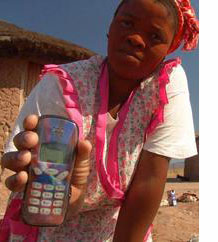 Great article in the UK Times about the mobile market in Africa and the enormous growth there.
Great article in the UK Times about the mobile market in Africa and the enormous growth there.
"This remarkable growth — the African market is expanding nearly twice as fast as Asia’s — has confounded analysts and even service operators. As recently as 2003, the International Telecommunications Union (ITU) forecast that there would be only 67 million users by the end of 2005.
“Many of us underestimated the strength of the informal sector in Africa,” said Michael Joseph, chief executive officer of Safaricom, Kenya’s biggest operator, with four million customers. “And the huge need and desire for people to communicate.”
